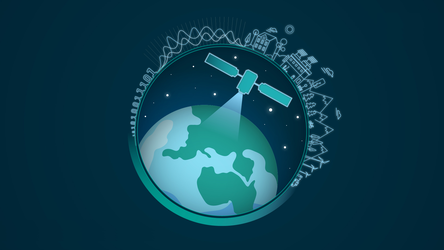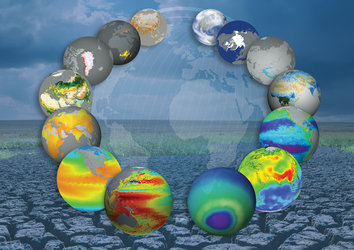Climate talks underway in South Africa
International delegates are convening in South Africa for this year’s UN Climate Change Conference. ESA representatives are attending the talks to stress the importance of continuing climate observations from space.
ESA is participating as an observer to the COP 17 conference, being held in the city of Durban from 28 November to 9 December.
On Wednesday evening, ESA will hold a side event along with the European Commission's Joint Research Centre (JRC) and the South African Space Agency (SANSA) on sustaining systematic climate observations from space.
Representatives from the three bodies will present their contributions to establishing a long-term, systematic observation system and outline how they are building capacity and training in Africa.

ESA will also discuss the Agency’s Climate Change Initiative and the Sentinel satellite series.
The Climate Change Initiative is using archived data going back three decades from Agency and Member-State satellites. Combined with data from new missions, this information is used to produce new, verified information on a wide range of climate variables.
New operational satellites like the Sentinel series of Earth-observing missions will ensure the continuity of this data. With the first three planned for launch in 2013, the missions will maintain a constellation of satellites continuously monitoring essential climate variables for the next three decades.
Thanks to ESA’s open data policy, climate research and modelling scientists worldwide will have free access to these data.
The Sentinels are being developed specifically for the operational needs of the Global Monitoring for Environment and Security programme.
ESA is running an exhibit entitled “Global Monitoring of our Climate” during the two weeks of COP 17.

In addition, ESA will participate in side events on the Reducing Emissions from Deforestation and Degradation (REDD+) scheme.
REDD+ uses satellite observations of forests and involves developed and developing countries working together for carbon offsetting. The scheme is currently implementing the GMES Service Element on Forest Monitoring services in Gabon and the Republic of Congo.
ESA began to work with the UN Framework Convention on Climate Change (UNFCCC) in 2001 and has been present at the UNFCCC Conferences of Parties since 2002.
Since the launch of Meteosat-1 in 1977, ESA has kept close watch on the global climate with its Earth observation missions. It continues to play a major role in studying and monitoring climate variation with satellites dedicated to the environment.
These satellites include the ERS satellites, Envisat, the Earth Explorers and the five Sentinel missions planned within the GMES programme.















 Germany
Germany
 Austria
Austria
 Belgium
Belgium
 Denmark
Denmark
 Spain
Spain
 Estonia
Estonia
 Finland
Finland
 France
France
 Greece
Greece
 Hungary
Hungary
 Ireland
Ireland
 Italy
Italy
 Luxembourg
Luxembourg
 Norway
Norway
 The Netherlands
The Netherlands
 Poland
Poland
 Portugal
Portugal
 Czechia
Czechia
 Romania
Romania
 United Kingdom
United Kingdom
 Slovenia
Slovenia
 Sweden
Sweden
 Switzerland
Switzerland




























